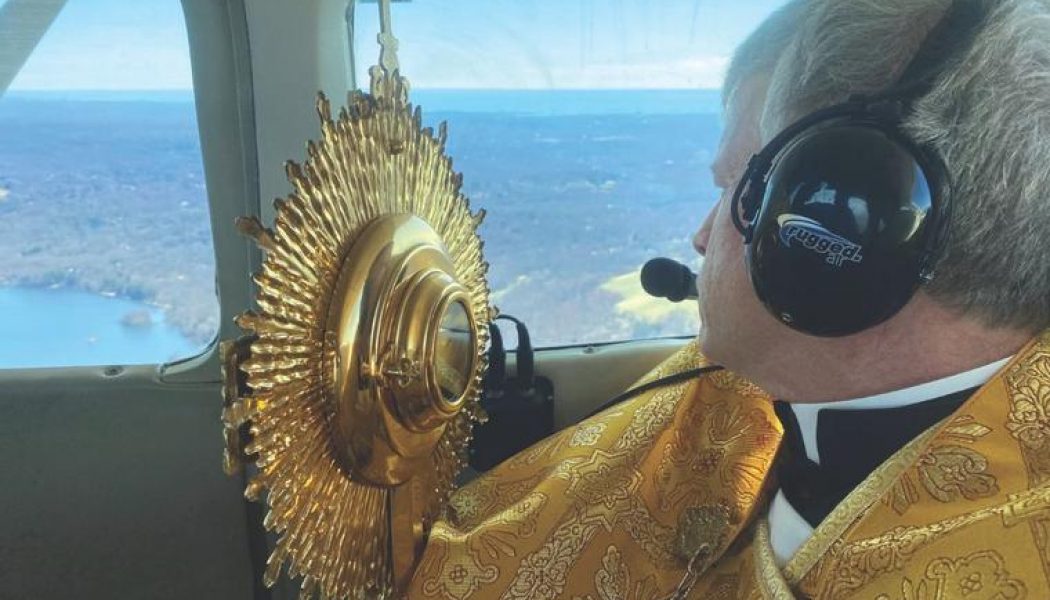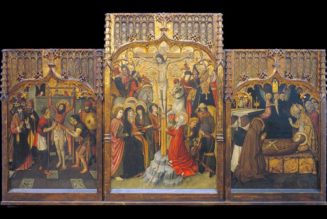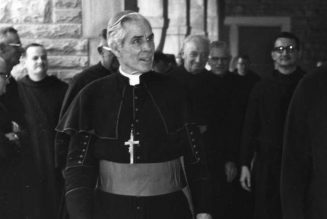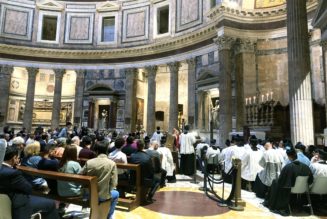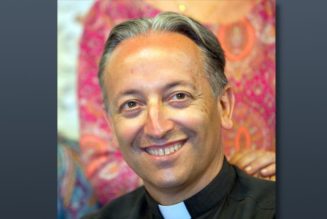
TRUMBULL, Conn. — Last March, when Father Brian Gannon, pastor of St. Theresa Catholic Church in Trumbull, learned of an impending government-ordered lockdown to prevent transmission of the novel coronavirus, his heart sank, and he feared for the future.
But within 10 days, the pastor found himself in a Cessna prop plane captained by a pilot-parishioner. Holding a monstrance with the Holy Eucharist and reciting the Rosary, Father Gannon flew across the Diocese of Bridgeport, stirring cheers from his parishioners and sparking headlines in local media.
The airborne Eucharistic blessing marked an unexpectedly promising initial response to a public-health crisis that would upend Catholic worship and parish life across the nation and the globe. And at St. Theresa, a suburban congregation of 3,000 families in the Diocese of Bridgeport, the inspiring spectacle reminded the faithful that God would not abandon them, but also that creativity and grit would be needed in the days ahead.
The Connecticut parish adapted. Outreach to shut-ins ramped up, with telephone calls that offered practical and spiritual support. During livestreamed Masses, the pastor provided words of hope and encouragement.
“I told them, ‘Whatever our earthly tragedies, the pandemic is revealing that we always have the Lord on our side,’” Father Gannon told the Register, recalling one early homily. “It is like being on Noah’s Ark: You get thrashed about in the storm, but you will be safe.”
Public worship on Palm Sunday and Easter Sunday was not permitted, but the pastor brought the Eucharist to local neighborhoods, standing in a jeep with the monstrance, while parishioners, previously alerted to the precise time of the visit, knelt outside their homes.
“If they couldn’t come to visit Our Lord,” said the pastor, “Our Lord would visit them.”
Many U.S. parishes matched St. Theresa’s rapid pivot to a new normal.
St. Walter Church in Roselle, Illinois, based in the Diocese of Joliet, recruited a team to check in with the parish’s 4,300 families, launched a crisis fund for the needy, and began daily livestreamed scriptural reflections.
“The idea is to make disciples through social media,” Father Mario Quejadas, the pastor, told the Register.
In Gilbert, Arizona, St. Anne Church upgraded the technology that supported the parish’s already-established social-media presence and livestreamed Masses to accommodate increased demand, doubling the parish census to 9,000 families within a year.
Early on, its pastor, Father Sergio Fita, responded to the cancelation of Mass on Palm Sunday and Easter Sunday by bringing the Eucharist to every home of a parish family, with three priests and a deacon driving 12 hours on each Sunday.
“As we arrived, people were moved to tears,” recalled Deacon Andrew Gilliland, the director of parish administration who brought the Eucharist to parishioners.
Many “fell to their knees, where they were standing and began to pray. In some cases, they made small altars in their homes, decorated with small candles.”
“I was taken by the fact they stayed kneeling until my car could not be seen anymore,” he said.
In Boonton, New Jersey, Father Daniel O’Mullane, pastor of Our Lady of Mount Carmel Church, worked with the parish men’s group to hold outdoor Masses in the rented parking lot of a local Walmart. Outdoor confessions were made available after the parish team bought and assembled a shed from Home Depot. And during the height of the pandemic, Father O’Mullane told the Register he spent 15 hours a week in the shed hearing confessions.
“The need for confession doesn’t go away during a pandemic,” he said bluntly. “Quite the opposite.”
And as he prepared for the nation to open up, he acknowledged that the parish community had deepened its sense of mission.
“We are less inclined now, because of our journey, to sit back and wait for the world to come to us,” he said. “We are going out.”
Distinct Challenges
In contrast, other parishes struggled to keep up with the pace of change, from shifting state directives and health protocols governing worship to the demand for high-quality livestreamed Masses and real-time parish outreach. And while the Holy See has given local bishops the authority to make reasonable adaptions to protect public health and ensure the proper celebration of the sacraments, some dioceses have faced unique challenges and may be subject to multiple county authorities, further complicating efforts to provide a strong, uniform approach.
“The Holy See is trusting the bishops will use good sense,” Father Andrew Menke, executive director of the Secretariat of Divine Worship for the U.S. Conference of Catholic Bishop, told the Register. “If there is a need to make an adaption from the norm, the bishops have the authority to do that.”
Last spring, Pope Francis, whose private morning Masses were livestreamed daily by the Vatican, spoke for Catholic priests across the globe as he expressed his unease with the Church’s unexpected reliance on technology to provide for livestreamed services and spiritual uplift.
“This pandemic has forced everyone to communicate, even religiously, even this Mass, through the communications media,” Francis said last April. “This is the Church in a difficult situation which the Lord permits, but the ideal of the Church is always with the people and the sacraments. … We must have familiarity with the Lord this way for now, but only so we can come out of the tunnel, not stay there.”
Now, as the Church begins to assess its response to the crisis, experts who have helped dioceses and parishes navigate this unprecedented time say there are important lessons to be learned and even a silver lining to be explored and celebrated.
“Confronted with a lot of dangers, the natural reaction is to be defensive, to try and defend ourselves against the danger,” Dominican Father Dominic Legge, the director of the Thomistic Institute and assistant professor in systematic theology at the Pontifical Faculty of the Immaculate Conception in Washington, D.C., told the Register.
But as the Church in the U.S. passed through the initial phase of the lockdown, Father Legge was among those who “became convinced that we needed to go on spiritual offense” and identify practical solutions that would allow parishes to provide the sacraments with minimum risk.
With that goal in mind, the Thomistic Institute worked with a team of experts in medicine, infectious disease, science, theology and pastoral care to tackle the challenge from every angle. Other organizations, like the Federation of Diocesan Liturgical Commissions, worked on similar resources.
“Worship is essential, and the sacraments are central to our life as Catholics,” said Father Legge. “Finding some way to make that possible in the midst of the pandemic was going on offense.”
New Parish Strategies
Father Legge has also observed the lockdown’s disruptive impact on traditional methods of parish outreach and believes that new strategies being developed now could benefit the Church going forward. At the same time, he and other experts emphasized livestream Mass would continue to be important for a period of time because a significant number of congregants still have not decided to return due to health concerns.
Scot Landry, who has worked in executive roles for Catholic organizations for the past 15 years, including the Archdiocese of Boston, echoed these points.
Over the past year, Landry has witnessed “the most mission-driven innovations … that I had seen in my lifetime,” he told the Register. “People’s lives have been upended, and that creates a great opportunity to be the ‘field hospital’ that Pope Francis has called us all to be.”
Last November, Landry formed a team of volunteers to launch the Parish Excellence Summit and the first-ever “Parish Excellence Awards.” Four hundred parishes from 35 states were nominated in categories that ranged from “livestreaming best practices that improve broadcast quality and increase participation” to “offertory recovery and retention-inspiring generosity during difficult times.” St. Walter, St. Anne and Our Lady of Mount Carmel were among the parishes that won awards.
The most effective parishes, he said, have used this time to update parishioners’ emails and phone numbers, with the goal of facilitating “great communication with everyone in the parish.”
Investments also have been made to improve broadcasts from inside the church for livestreamed Masses and Eucharistic adoration, “so that people could ‘visit’ Jesus in the tabernacle virtually.”
Landry urged pastors to involve “parishioners in brainstorming sessions that ask: How can people hear about what we are doing? How can we make sure they have a warm experience of community? How can we help people learn more about the faith and our practices during this time when we are less busy outside of the house?”
And once the basics are in place, the most dynamic parishes work on constantly improving engagement.
“One parish had families take turns recording the announcements and general intercessions, prompting parishioners to tune in so they could see who was doing it that week and to see more of their fellow parishioners.”
This kind of creativity and innovation will continue to pay dividends down the road, he predicted, particularly if pastors maintain a relentless focus on community outreach.
‘At a Crossroads’
Back in Trumbull, Connecticut, Father Gannon expressed similar hopes leavened by a measure of anxiety as members of his flock slowly emerge from the lockdown and return to the sacraments.
For some, he said, it has been a period of “self-examination” and “purification,” leading to a deepened relationship with the Lord. But he knows that others have pulled back or drifted away, and he is now preparing to take up this fresh challenge.
“We are at a crossroads,” he said simply. “Some have gotten used to livestreamed Mass. Yet personal encounter is the key to our faith, and they need to come back.
“We need to go after the lost sheep.”
Join Our Telegram Group : Salvation & Prosperity
